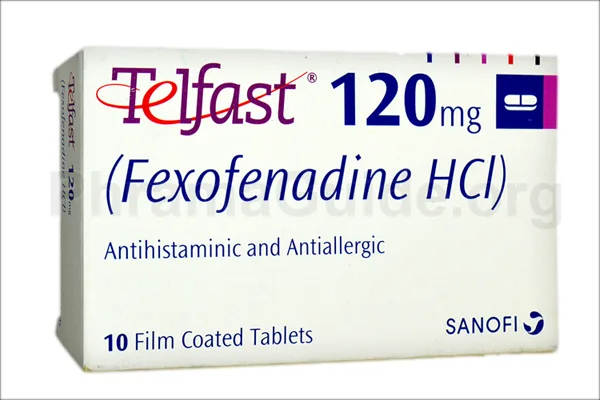Telfast tablet is used to treat various allergic reactions including seasonal and perennial allergic rhinitis. It belongs to an antihistamine class of medications. Following are some common uses of Telfast Tablet:
- Seasonal Allergic Rhinitis: Telfast tablet is used to treat symptoms of seasonal allergic rhinitis, such as sneezing, runny or stuffy nose, itchy or watery eyes, and itching of the nose or throat, that occur due to exposure to allergens such as pollen, dust mites, or animal dander.
- Perennial Allergic Rhinitis: Telfast tablet is also used to treat symptoms of perennial allergic rhinitis, which is a type of allergic rhinitis that occurs for a long time of duration (months or years) and is caused by dust, pet, or fungal growth (mold) at home.
- Chronic Idiopathic Urticaria: Telfast tablet is used to relieve the symptoms of chronic idiopathic urticaria, a type of skin rash that appears spontaneously and persists for more than 6 weeks, and is not caused by an identifiable allergen.
- Allergic Conjunctivitis: Telfast tablet is also used to relieve the symptoms of allergic conjunctivitis, which is an inflammation of the conjunctiva of the eye due to exposure to allergens such as pollen, dust, or pet dander.
Off-label Uses of Telfst Tablet
- Eosinophilic Esophagitis: Telfast tablet is used off-label to treat eosinophilic esophagitis, a chronic immune-mediated condition characterized by inflammation of the esophagus. It may help reduce symptoms such as difficulty swallowing, chest pain, and heartburn.
- Pruritus (Itching) Associated with Other Conditions: Telfast tablets may be used to manage pruritus (itching) caused by conditions such as atopic dermatitis (eczema), urticaria (hives), or other allergic skin reactions.

What is Telfast?
Telfast is one of the leading brands of Fexofenadine, manufactured and marketed by Sanofi Aventis (Pakistan) Ltd.
Telfast Alternatives : Other Similar Brands
The following are some alternative brands of Telfast and their manufacturers.
- Fexet : Getz Pharmaceuticals (Pvt) Ltd, Pakistan.
- Fexo : Hilton Pharmaceuticals (Pvt) Ltd, Pakistan.
- Aloc : Bosch Pharmaceuticals (Pvt) Ltd, Pakistan.
- Softin F : Werrick Pharmaceuticals, Pakistan.
- Fifex : Shaigan Pharmaceuticals (Pvt) Ltd, Pakistan.
- Fexofast : Platinum Pharmaceuticals (Pvt) Ltd, Pakistan.
- Novahist : Pacific Pharmaceuticals Ltd, Pakistan.
- Fendina : Highnoon Laboratories Ltd, Pakistan.
- Fexofin : Bio Labs (Pvt) Ltd, Pakistan.
- Genfix : Genix Pharmaceuticals (Pvt) Ltd, Pakistan.
Telfast : Available Formulations and Strengths
Presently, Telfast is available in Tablets Form.
Telfast Tablets : 60mg, 120mg, and 180mg strengths.
Who Should Not Use Telfast?
Telfast has some contraindications that should be taken into consideration before using this medication. These include:
Hypersensitivity: Telfast is contraindicated in individuals who have a known hypersensitivity or allergy to Telfast or any of its ingredients.
End-stage Kidney Disease: Telfast is contraindicated in individuals with end-stage kidney disease or severe renal impairment, as it may accumulate in the body and cause adverse effects.
Hypertension or Cardiac Issues: Telfast should not use Telfast prior to discussion with a doctor, who suffers from high blood pressure (hypertension) or cardiac problems. It can cause increase blood pressure levels and palpitations in some patients.
Use with Certain Medications: Telfast should not be taken with certain medications, such as ketoconazole or erythromycin, as these drugs can interfere with the metabolism of Telfast and increase its levels in the body, leading to adverse effects.
Pregnancy and Breastfeeding: Telfast is not recommended for use during pregnancy or breastfeeding, as its safety and effectiveness have not been established in these populations.
What is the Recommended Daily Dosage of Telfast?
Telfast Adult Dose for Allergic Rhinitis or Chronic Idiopathic Urticaria: The dose is one tablet of 180mg once daily.
Telfast Dose for Children (6 to 11 years): The usual dose is 30mg (half tablet of 60mg) twice daily.
Telfast is not recommended for use in children under 6 years of age, as its safety and effectiveness in this population have not been established.
How Telfast Works?
Telfast selectively blocks the histamine H1 receptor, which is responsible for mediating the allergic response in the body. By blocking the H1 receptor, Telfast prevents histamine from binding to the receptor and causing the symptoms of allergy.

Leave A Comment